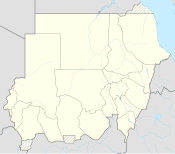
Muhammad Ahmad bin Abdullah bin Fahal was a Sudanese religious and political leader of Nubian descent. In 1881, he claimed to be the Mahdi, and led a successful war against Egyptian rule in Sudan which culminated in the victorious siege of Khartoum. He created a vast Islamic state extending from the Red Sea to Central Africa, and founded a movement that remained influential in Sudan a century later.
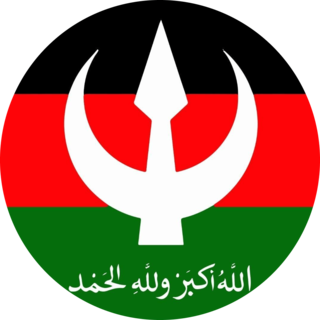
The National Umma Party is an Islamic political party in Sudan. It was formerly led by Sadiq al-Mahdi, who served twice as Prime Minister of Sudan, and was removed both times by military coups. As of 2019, Major General Fadlallah Baramah Nasser was the acting Chair of the party, and al-Mahdi's daughter, Mariam al-Mahdi, was one of the three vice-chairs.

Sadiq al-Mahdi, also known as Sadiq as-Siddiq, was a Sudanese political and religious figure who was Prime Minister of Sudan from 1966 to 1967 and again from 1986 to 1989. He was head of the National Umma Party and Imam of the Ansar, a Sufi order that pledges allegiance to Muhammad Ahmad (1844–1885), who claimed to be the Mahdi, the messianic saviour of Islam.

Abdullah Ibn-Mohammed Al-Khalifa or Abdullah al-Khalifa or Abdallahi al-Khalifa, also known as "The Khalifa" was a Sudanese Ansar ruler who was one of the principal followers of Muhammad Ahmad. Ahmad claimed to be the Mahdi, building up a large following. After Ahmad's death, Abdullah Ibn-Mohammed took over the movement, adopting the title of Khalifat al-Mahdi. He attempted to create a kingdom, which led to widespread discontent, and his eventual defeat and death at the hands of the British and Egyptians.
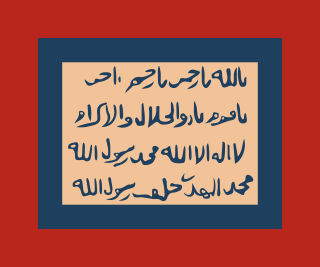
The Mahdist State, also known as Mahdist Sudan or the Sudanese Mahdiyya, was a state based on a religious and political movement launched in 1881 by Muhammad Ahmad bin Abdullah against the Khedivate of Egypt, which had ruled the Sudan since 1821. After four years of struggle, the Mahdist rebels overthrew the Ottoman-Egyptian administration and established their own "Islamic and national" government with its capital in Omdurman. Thus, from 1885 the Mahdist government maintained sovereignty and control over the Sudanese territories until its existence was terminated by the Anglo-Egyptian forces in 1898.

On 25 May, 1969, several young officers calling themselves the Free Officers Movement seized power in Sudan and started the Nimeiry era, also called the May Regime, in the history of Sudan. At the conspiracy's core were nine officers led by Colonel Jaafar Nimeiry, who had been implicated in plots against the Abboud regime. Nimeiry's coup preempted plots by other groups, most of which involved army factions supported by the Sudanese Communist Party (SCP), Arab nationalists, or conservative religious groups. He justified the coup on the grounds that civilian politicians had paralyzed the decision-making process, had failed to deal with the country's economic and regional problems, and had left Sudan without a permanent constitution.

The dominant religion in Sudan is Islam practiced by around 90.7% of the nation's population. Christianity is the largest minority faith in country accounting for around 5.4% of the population. A substantial population of the adherents of traditional faiths is also present.
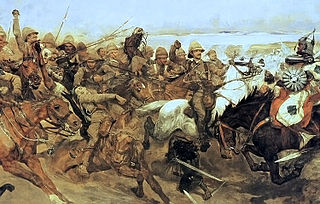
The Mahdist War was a war between the Mahdist Sudanese, led by Muhammad Ahmad bin Abdullah, who had proclaimed himself the "Mahdi" of Islam, and the forces of the Khedivate of Egypt, initially, and later the forces of Britain. Eighteen years of war resulted in the creation of Anglo-Egyptian Sudan (1899–1956), a de jure condominium of the British Empire and the Kingdom of Egypt in which Britain had de facto control over Sudan. The Sudanese launched several unsuccessful invasions of their neighbours, expanding the scale of the conflict to include not only Britain and Egypt but also the Italian Empire, the Congo Free State and the Ethiopian Empire.
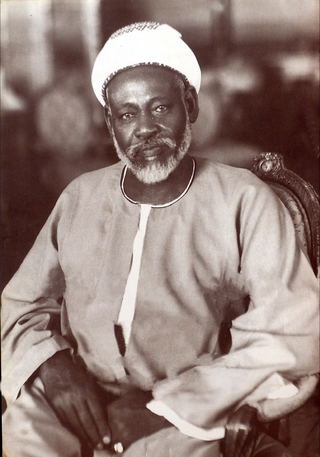
Sayyid Abd al-Rahman al-Mahdi, KBE was one of the leading religious and political figures during the colonial era in Anglo-Egyptian Sudan (1898–1955), and continued to exert great authority as leader of the Neo-Mahdists after Sudan became independent. The British tried to exploit his influence over the Sudanese people while at the same time profoundly distrusting his motives. Throughout most of the colonial era of Anglo-Egyptian Sudan, the British saw Sayyid Abd al-Rahman al-Mahdi as important as a moderate leader of the Mahdists.
Barakat is a town in Al Jazirah state, Sudan. It lies on the west shore of the Blue Nile to the south of Wad Madani.
al-Shakaba is a community in Al Jazirah state, Sudan. It lies on the west shore of the Blue Nile near Barakat, to the south of Wad Madani. The village is within the Gezira scheme, which provides irrigation water for cotton cultivation.
Sayyid Muhammad Sharif was one of the three Kalifas or lieutenants of Muhammad Ahmad (1844–1885), who styled himself the Mahdi, the others being Ali wad Hilu and Abdallahi ibn Muhammad. Muhammad Sharif was the son of Hamid Muhammad, first cousin of the Mahdi.

The Ansar are a Sufi religious movement in the Sudan whose followers are disciples of Muhammad Ahmad, a Sudanese religious leader based on Aba Island who proclaimed himself Mahdi on 29 June 1881. His followers won a series of victories against the Egyptians culminating in the capture of Khartoum in January 1885.

Sir Geoffrey Francis Archer was an English ornithologist, big game hunter and colonial official. He was Commissioner and then Governor of British Somaliland between 1913 and 1922, and was responsible for finally quelling the twenty-year-long Dervish resistance.
The Socialist Republican Party was a political party in Sudan, founded in 1951. Ibrahim Bedri was the general secretary of the party. The party was floated ahead of the 1953 Sudanese legislative election. The party mobilized a section of tribal chiefs and sheikhs. However, the development of the Socialist Republican Party never took off, and the party lacked financial resources, organizational structures and a coherent programme.
The Battle of Aba, which took place on August 12, 1881, was the opening battle of the Mahdist War. The incident saw Mahdist rebels, led by Muhammad Ahmad, who had proclaimed himself the Mahdi, rout Egyptian troops who had landed on Aba Island.

The Mahdi's tomb or qubba is located in Omdurman, Sudan. It was the burial place of Muhammad Ahmad, the leader of an Islamic revolt against Turco-Egyptian Sudan in the late 19th century.

The jibba or jibbah, originally referring to an outer garment, cloak or coat,) is a long coat worn by Muslim men. During the Mahdist State in Sudan at the end of the 19th century, it was the garment worn by the followers of the Mahdī. Muhammad Ahmad proclaimed himself al-Mahdī al-Muntaẓar, successor of the Islamic prophet Muhammad, in 1881. He exhorted his followers to join a jihad against Turco-Egyptian Sudan.
Muhammad Said al-Qaddal was a Sudanese intellectual and historian whose research and views are distinguished for their depth and clarity, particularly the ones regarding the history of certain Sudanese religious communities and ideological parties, as well as his research on the field of educational curriculum.

Carl Christian Giegler was a German-born telegraph engineer who acted as governor-general of the Egyptian province of Sudan from February to May 1882 around the start of the Mahdist War.

